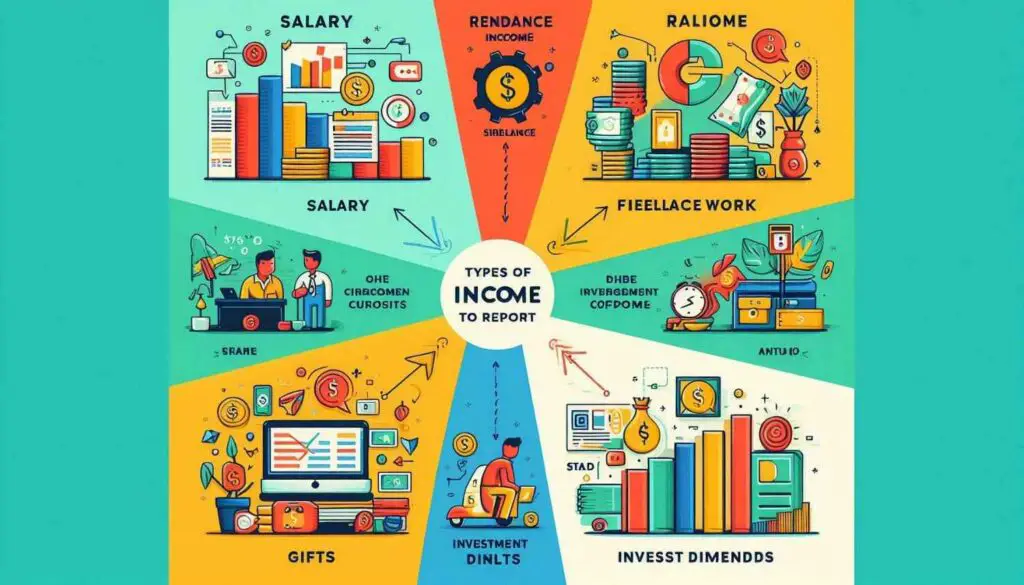Confused about filing taxes as a gig worker? Learn step-by-step How to File Taxes for Gig Economy Workers in the USA, maximize deductions, and avoid common mistakes in our comprehensive guide tailored for gig economy workers.
How to File Taxes for Gig Economy Workers in the USA

Introduction
Filing taxes as a gig economy worker in the USA can be overwhelming.
Unlike traditional employees who receive W-2s, gig workers are often classified as independent contractors.
This status means you’re responsible for reporting your income, paying taxes, and handling deductions yourself.
If you’re navigating this complex tax landscape for the first time, don’t fret—this guide will walk you through every step.
From understanding your income to leveraging deductions and paying quarterly taxes, we’ll cover all you need to know to file your taxes as a gig worker effectively.
So, grab a cup of coffee, and let’s dive into the world of taxes for gig economy workers!
Understanding the Gig Economy

What is the Gig Economy?
The gig economy is a rapidly growing sector of the workforce characterized by short-term, flexible jobs.
Rather than working for a single employer, gig workers take on various gigs—anything from freelance writing to driving for Uber, delivering food, or even renting out your home on Airbnb.
These jobs are often performed on a contract or freelance basis, and they offer a level of flexibility that traditional jobs may not.
Whether it’s a side hustle or your primary source of income, participating in the gig economy means you’re part of this dynamic and evolving market.
Who are Gig Workers?
Gig workers are individuals who earn income from various short-term jobs, projects, or freelance work instead of a steady paycheck from a single employer.
This includes freelancers, independent contractors, rideshare drivers, delivery workers, online sellers, and more.
The gig economy allows people to work on their terms, which is especially appealing in today’s fast-paced world.
Whether you’re delivering food, driving passengers, writing articles, or offering consulting services, you’re a gig worker contributing to this booming economy.
The Rise of Gig Work in the USA
The gig economy has seen explosive growth in the USA over the past decade.
Factors like the rise of digital platforms, economic shifts, and a desire for flexible work have fueled this trend.
According to recent studies, millions of Americans now participate in the gig economy, either as their primary source of income or as a supplemental job.
The flexibility to choose when and where you work has made gig work increasingly popular, especially among younger workers and those seeking to balance multiple responsibilities.
But with this flexibility comes the responsibility of managing your own taxes, which can be a daunting task.
Challenges Faced by Gig Workers
While the gig economy offers flexibility and the potential for higher earnings, it also presents unique challenges—particularly when it comes to taxes.
Unlike traditional employees, gig workers don’t have taxes automatically withheld from their paychecks.
This means you need to set aside money throughout the year to cover your tax obligations.
Additionally, you must keep track of all your income and expenses, which can be overwhelming if you’re juggling multiple gigs.
Understanding how to properly file taxes as a gig worker is crucial to avoiding penalties and maximizing your earnings.
Tax Responsibilities for Gig Workers

Independent Contractor Status
As a gig worker, you’re typically classified as an independent contractor.
This status is different from that of a traditional employee, and it comes with its own set of responsibilities.
As an independent contractor, you’re considered self-employed, which means you’re responsible for reporting all your
income and paying your own taxes. You don’t receive a regular paycheck, and no one withholds taxes on your behalf.
Instead, you’re paid in full for your work, and it’s up to you to set aside enough money to cover your taxes.
The Importance of Tax Compliance
Staying compliant with tax laws is essential for gig workers. Failing to report your income accurately or neglecting to pay your taxes can lead to penalties, interest, and even legal trouble.
The IRS takes tax compliance seriously, and as a gig worker, you are responsible for ensuring that you accurately report all your earnings.
This means keeping detailed records of your income and expenses, understanding which tax forms to file, and making sure you pay any taxes owed by the deadlines.
Proper tax compliance not only keeps you out of trouble but can also help you maximize your deductions and reduce your overall tax liability.
1099 Forms Explained
When you work as an independent contractor, you’ll typically receive a 1099 form instead of a W-2.
The most common form is the 1099-NEC, which stands for Non-Employee Compensation.
This form is issued by any client who has paid you more than $600 during the year.
It reports the total amount paid to you, and you’ll use this information to file your taxes.
However, even if you don’t receive a 1099 form from a client (perhaps because you earned less than $600 from them), you’re still required to report that income.
It’s important to keep track of all your earnings, regardless of whether you receive a 1099 form.
Reporting Your Income
As a gig worker, you must report all your income on your tax return.
This includes not just the income reported on your 1099 forms, but also any other earnings, such as cash payments, tips, or income received through apps like Venmo or PayPal.
It’s crucial to keep thorough records of all your income sources throughout the year, as failing to report income can result in penalties.
You’ll report your income on Schedule C (Profit or Loss from Business), which you’ll file along with your regular 1040 tax return.
This form allows you to calculate your net income (total income minus business expenses), which is the amount on which you’ll pay taxes.
Types of Income to Report

Gross Income vs. Net Income
When it comes to filing your taxes, it’s important to understand the difference between gross income and net income.
Gross income is the total amount you earn from your gigs before any expenses are deducted.
This includes all payments received from clients, tips, and any other income related to your gig work.
Net income, on the other hand, is what’s left after you’ve deducted your business expenses.
You’ll report your net income on your tax return, as this is the amount that is subject to income tax and self-employment tax.
Keeping track of your gross income and expenses is crucial to accurately calculating your net income.
Common Sources of Gig Income
Gig income can come from a variety of sources, and it’s important to report all of them on your tax return.
Some common sources of gig income include:
- Freelance projects: Payments received for freelance work, such as writing, graphic design, programming, consulting, and more.
- Rideshare driving: Earnings from driving for services like Uber or Lyft, including fares, tips, and bonuses.
- Delivery services: Income from delivering food, groceries, or packages through platforms like DoorDash, Postmates, or Instacart.
- Online sales: Revenue from selling goods on platforms like eBay, Etsy, or Amazon.
- Rental income: Money earned from renting out property on Airbnb or similar platforms.
- Content creation: Payments received for creating content, such as videos, blog posts, or social media sponsorships.
Remember, all income you earn from gig work, regardless of the source or payment method, must be reported on your tax return.
Business Expenses and Deductions
What Can You Deduct?
One of the advantages of being a gig worker is the ability to deduct business expenses from your income, which can significantly reduce your tax liability.
The IRS allows you to deduct expenses that are both “ordinary and necessary” for your business. Some common deductible expenses include:
- Vehicle expenses: If you use your car for gig work (such as rideshare driving or deliveries), you can deduct either your actual expenses (gas, maintenance, insurance) or the standard mileage rate set by the IRS.
- Home office expenses: If you have a dedicated space in your home that you use exclusively for your gig work, you can deduct a portion of your rent or mortgage, utilities, and other related expenses.
- Supplies and equipment: The cost of any supplies, tools, or equipment you use for your work can be deducted. This includes items like a laptop, printer, office supplies, and software.
- Advertising and marketing: Expenses related to promoting your gig services, such as website hosting, business cards, or social media ads, are deductible.
- Training and education: If you take courses or attend workshops to improve your skills related to your gig work, you can deduct the cost of tuition, books, and other related expenses.
Keeping Track of Expenses
Keeping accurate records of your expenses is crucial for maximizing your deductions.
It’s a good idea to use an app or a spreadsheet to track your expenses throughout the year.
Save all your receipts and make notes about what each expense was for.
This habit will make it much easier to calculate your deductions when it comes time to file your taxes.
Additionally, having detailed records can be invaluable if you’re ever audited by the IRS.
By staying organized and keeping thorough records, you’ll be able to take full advantage of all the deductions available to you as a gig worker.
Self-Employment Taxes

What is Self-Employment Tax?
In addition to income tax, gig workers are also responsible for paying self-employment tax.
This tax covers your Social Security and Medicare contributions, which would normally be split between you and an employer if you were a W-2 employee.
As a self-employed individual, you’re responsible for the full amount, which is currently 15.3% of your net income (12.4% for Social Security and 2.9% for Medicare).
This tax is in addition to your regular income tax, so it’s important to budget for it throughout the year.
Calculating Self-Employment Tax
To calculate your self-employment tax, you’ll need to determine your net income from your gig work.
This is done by subtracting your allowable business expenses from your gross income. Once you have your net income, you apply the self-employment tax rate, which is currently 15.3%. For example, if your net income is $50,000, your self-employment tax would be $7,650 (15.3% of $50,000).
Keep in mind that you can also deduct the employer-equivalent portion of your self-employment tax (half of the total) on your income tax return, which can reduce your taxable income.
Paying Estimated Taxes
Because taxes aren’t withheld from your gig earnings, the IRS requires you to pay estimated taxes quarterly.
These payments cover your federal income tax, self-employment tax, and any state or local taxes you may owe. Estimated taxes are due on the 15th of April, June, September, and January.
If you don’t pay enough in estimated taxes throughout the year, you may face penalties at tax time.
To calculate your estimated payments, you can use IRS Form 1040-ES, which includes a worksheet to help you determine how much you should pay each quarter.
Filing Your Tax Return
Forms You’ll Need
When it comes time to file your taxes, there are several forms you’ll need to complete.
The most important is IRS Form 1040, which is the standard individual income tax return form.
In addition, as a gig worker, you’ll need to fill out Schedule C (Profit or Loss from Business) to report your income and expenses from your gig work.
This form is used to calculate your net income, which you’ll then transfer to your Form 1040. If you’re paying self-employment tax, you’ll also need to complete Schedule SE (Self-Employment Tax).
Steps to Filing
Filing taxes as a gig worker involves several steps:
- Gather Your Records: Collect all your 1099 forms, records of income, and receipts for business expenses.
- Complete Schedule C: Use this form to report your income and expenses and calculate your net income.
- Complete Schedule SE: Calculate your self-employment tax using this form.
- Fill Out Form 1040: Transfer the information from Schedule C and Schedule SE to your 1040 form.
- Review Your Return: Double-check all your entries to make sure everything is accurate.
- Submit Your Return: File your tax return electronically or by mail by the April 15th deadline.
Common Mistakes to Avoid
Filing taxes as a gig worker can be tricky, and there are several common mistakes to watch out for:
- Underreporting Income: Make sure you report all your income, even if you didn’t receive a 1099 form for it.
- Missing Deductions: Don’t forget to deduct all your eligible business expenses, as this can significantly lower your tax bill.
- Not Paying Estimated Taxes: If you don’t pay enough in estimated taxes throughout the year, you could face penalties.
- Filing Late: Make sure you file your return and pay any taxes owed by the April 15th deadline to avoid penalties and interest.
Leveraging Tax Deductions
Maximizing Your Deductions
One of the best ways to reduce your tax liability as a gig worker is by taking advantage of all the deductions you’re entitled to. In addition to the deductions we’ve already discussed, there are several others you might be eligible for, depending on the nature of your gig work:
- Health Insurance Premiums: If you pay for your own health insurance, you may be able to deduct the premiums.
- Retirement Contributions: Contributions to a SEP IRA, SIMPLE IRA, or solo 401(k) can be deducted, lowering your taxable income.
- Self-Employment Tax Deduction: As mentioned earlier, you can deduct the employer-equivalent portion of your self-employment tax.
Avoiding Red Flags
While it’s important to claim all the deductions you’re entitled to, you should be careful not to raise any red flags with the IRS.
Some deductions, like the home office deduction, are often scrutinized closely, so it’s important to ensure you’re following the rules.
For example, your home office must be used exclusively for your business, and it must be your principal place of business.
If you’re unsure about a particular deduction, it may be worth consulting with a tax professional to make sure you’re in compliance.
State and Local Taxes
Understanding Your Obligations
In addition to federal taxes, you may also be required to pay state and local taxes on your gig income.
Each state has its own tax laws, so it’s important to understand your obligations. Some states have a flat income tax rate, while others have a progressive tax system. Additionally, some cities and counties may impose local income taxes.
Be sure to check with your state and local tax authorities to find out what you need to pay.
Filing State and Local Taxes
When it comes to filing state and local taxes, the process is similar to filing your federal taxes.
You’ll need to report your income, claim any deductions, and calculate the taxes you owe.
Some states require quarterly estimated tax payments, just like the federal government.
Make sure you keep detailed records and file your state and local tax returns by the deadline to avoid penalties.
Getting Help with Your Taxes
Hiring a Tax Professional
If you’re feeling overwhelmed by the complexities of filing taxes as a gig worker, you may want to consider hiring a tax professional.
A CPA or enrolled agent can help you navigate the tax code, identify deductions, and ensure you’re in compliance with all tax laws.
While hiring a tax professional can be an added expense, it can also save you time, reduce your stress, and potentially lower your tax bill.
Also Read – Best Crypto Savings Accounts for US Residents
Using Tax Software
Another option is to use tax software to prepare and file your taxes.
Many tax software programs are designed specifically for self-employed individuals and gig workers, and they can guide you through the process step by step.
Tax software can be a cost-effective option, and it can help you avoid mistakes by automatically checking your return for errors.
Some popular tax software options include TurboTax, H&R Block, and TaxAct.
IRS Resources
The IRS offers a variety of resources to help gig workers file their taxes.
The IRS website has a wealth of information on topics like self-employment tax, estimated taxes, and deductions.
Additionally, the IRS offers free tax assistance programs, such as the Volunteer Income Tax Assistance (VITA) program, which provides free tax help to people who earn $60,000 or less.
The IRS also offers free tax filing through its Free File program for those who qualify.
Conclusion
Filing taxes as a gig economy worker can be challenging, but it doesn’t have to be overwhelming.
By understanding your tax responsibilities, keeping accurate records, and taking advantage of deductions, you can navigate the tax system with confidence.
Whether you choose to handle your taxes on your own, use tax software, or hire a professional, the key is to stay organized and proactive throughout the year.
By doing so, you’ll be well on your way to meeting your tax obligations and maximizing your earnings as a gig worker.
FAQs
1. Do I have to report income if I didn’t receive a 1099 form?
Yes, you are required to report all income from your gig work, even if you did not receive a 1099 form from a client.
2. Can I deduct my home office if I also use it for personal activities?
No, to claim the home office deduction, your workspace must be used exclusively and regularly for your business.
3. What happens if I don’t pay estimated taxes?
If you don’t pay enough in estimated taxes throughout the year, you may face penalties when you file your tax return.
4. Can I deduct the cost of health insurance premiums?
Yes, if you pay for your own health insurance, you may be able to deduct the premiums, reducing your taxable income.
5. Is it better to use tax software or hire a tax professional?
It depends on your situation. Tax software is a cost-effective option and can be useful for simpler tax situations. However, hiring a tax professional can be beneficial if you have complex tax issues or want personalized advice.


1 thought on “How to File Taxes for Gig Economy Workers in the USA”